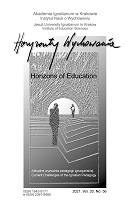Active Forms of Conducting European Studies: Experience, Analysis, Conclusions
Active Forms of Conducting European Studies: Experience, Analysis, Conclusions
Author(s): Svitlana Sysoieva, Olena Lokshyna, Olena Protsenko, Ilona TryhubSubject(s): Education, Higher Education
Published by: Uniwersytet Ignatianum w Krakowie
Keywords: higher education; PhD students; ensuring quality; active forms; education;
Summary/Abstract: RESEARCH OBJECTIVE: The purpose of the paper is to assess the efficiency of the active forms (Quiz, One Pager, the World Café, Visualization: Mind Mapping, Interactive lecture-discussion) used within the European studies for PhD students on ensuring quality of higher education. THE RESEARCH PROBLEM AND METHODS: The empirical material of the research was collected by questionnaire with the direct participation of the authors. The respondents were asked to rate each of the active forms on a Likert scale from 1 to 5 points in order to obtain a rating scale for each of the active forms. THE PROCESS OF ARGUMENTATION: The main professional and general competencies of PhD degree seekers (ability to analyse, evaluate and synthesize new and complex ideas; ability to apply knowledge in practical situations; ability to work in a team etc) can be developed using the active forms of training. RESEARCH RESULTS: The study showed that active forms are effective for the European studies and development of the professional competence of PhDs. CONCLUSIONS, INNOVATIONS, AND RECOMMENDATIONS: The active forms are promising for PhD students’ training, especially for the instruction of complex knowledge and the formation of transversal competencies. No less important is the conclusion about the need to use a set of methods that together ensure the implementation of the full range of educational tasks.
Journal: Horyzonty Wychowania
- Issue Year: 20/2021
- Issue No: 56
- Page Range: 133-145
- Page Count: 13
- Language: English

